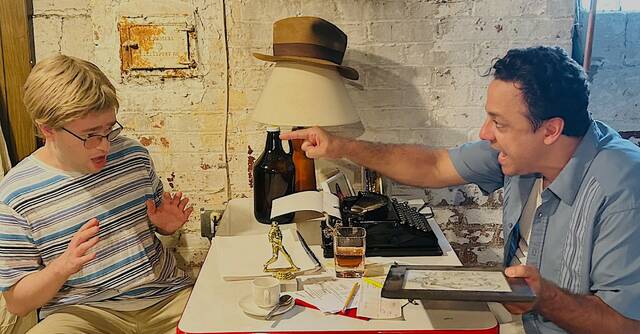https://triblive.com/local/carlynton/after-tumultuous-times-pict-classic-theatre-looks-to-an-exciting-future/
After tumultuous times, PICT Classic Theatre looks to an exciting future

PICT Classic Theatre is back with a new name, an expanded mission and a history full of acclaimed productions, financial issues and turnover at the top. The company returned to the stage for the first time in more than two years Friday with its production of the Pittsburgh-set play “Andy Warhol’s Tomato” by McKeesport-born playwright Vince Melocchi, which runs through Oct. 6.
Now Pittsburgh International Classic Theatre, PICT was founded as Pittsburgh Irish and Classical Theatre in 1996 by Andrew Paul and Stephanie Riso.
The new name demonstrates an expansion of the current board’s goals.
“That’s an intent to broaden our mission to focus on classic theater from across the world. We were Pittbsurgh Irish and Classical Theatre, and obviously, Ireland is part of the international community, but we want to make our mission more focused on all international classics and really try and tap into some things that we hadn’t done before,” said board president Joseph Parsons.
Elizabeth Elias Huffman — an experienced and passionate international director from Monongahela — is now at the helm, and the theater’s new home is the Carnegie Stage in Carnegie.
Though a Southwestern Pennslyvania native, she has worked with companies and productions all over the world, and she’s committed to finding communities within Pittsburgh whose voices aren’t frequently heard.
“There are so many people from around the world here … and their stories aren’t being told and represented. From the Middle Eastern community, the Latino community, the Asian community … I want to be able to extend to the members of those communities if they have been actors in their country, come to me,” Huffman said.
Bringing Huffman on was also a move towards fiscal responsibility, Parsons said, because she is able to put on excellent productions inexpensively. Huffman said that she is a “thrift store person.”
“I said to the board from the get-go, I have absolutely no intention of producing anything unless we have the money in the bank. I don’t believe in debt and I am also a master of making it look like I spent a lot of money when I didn’t,” Huffman said.
“Andy Warhol’s Tomato” is a two-man play that takes place in Pittsburgh in 1946. It finds a young Andy Warhol forging an unlikely friendship with a bar owner from Homestead.
“The play is really about tolerance for each other, a gay man meeting a straight Italian-American working-class guy, their values, how they clash, how they find ways to come together in a friendship. It’s a beautiful play,” Huffman said.
PICT has operated at fluctuating levels of financial viability throughout its history, but its nadir came during the covid-19 pandemic. Plagued by debt and unable to present anything on the stage, they had to re-evaluate the path forward.
“A lot of what we did was both modern and classical Irish plays, as well as a lot of English-language translations of other European work,” said Andrew Paul, PICT’s first artistic director.
The company grew quickly in the 2000s.
“I didn’t have any intention of playing small, I wanted it to be a competitor for (Pittsburgh) Public (Theater) and City (Theatre). A lot of people believe this, we were probably doing some of the best theater in Pittsburgh in that decade,” Paul said.
They peaked with around 4,000 season subscribers in the late 2000s, or around half of the subscription base of Pittsburgh Public Theater, according to Paul. Thanks to endowments from foundations and a few particularly generous donors, the company had to take on minimal debt during his tenure, he said.
PICT was doing innovative productions, including tours in Ireland and single-playwright festivals for masters like Samuel Beckett and Harold Pinter.
In 2013, PICT’s board ousted Paul from his role as artistic director. After his wife had gotten a job in Las Vegas two years previously, he had been splitting his time between the two cities. The board replaced Paul with Alan Stanford, an actor and director who came to PICT in 2008 at Paul’s behest.
“Now it’s kind of water under the bridge at this point. … It split the board a bit. At that time, they just didn’t think that somebody could work from another state and run the company effectively. There was a section of the board that believed that, so that caused a lot of turmoil. Some of the powers that be decided to make a change, and that’s when they brought Alan on board,” Paul said.
Paul now serves as producing artistic director of Kinetic Theatre in Pittsburgh. “I wanted to keep active, I wanted to keep my connection to Pittsburgh, I spun it off with the idea of doing a lot of newer European and English and Irish work,” Paul said.
Stanford would remain the artistic director of PICT until 2022.
In 2023, after some soul-searching and tenacity, the board brought on a new artistic director and looked to a future of renewed success.
Parsons is optimistic about the steps they’ve taken.
“We asked a lot of hard questions, we thought about what we can actually afford, we wanted to bring in someone who was committed to that financial discipline,” he said.
To learn more about the production and get tickets, visit picttheatre.org.
Copyright ©2026— Trib Total Media, LLC (TribLIVE.com)
